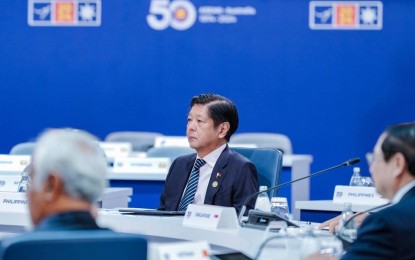
LEADERS’ PLENARY. President Ferdinand R. Marcos Jr. delivers his remarks during the plenary session at the ASEAN-Australia Special Summit in Melbourne on Wednesday (March 6, 2024). During his intervention, Marcos highlighted the ASEAN-Australia cooperation on maritime issues, climate and clean energy track, people-to-people exchanges, and economic cooperation. (Photo from PBBM’s official Facebook page)
MANILA – President Ferdinand R. Marcos Jr. on Wednesday emphasized the importance of closer cooperation and collaboration between the Association of Southeast Asian Nations (ASEAN) and Australia to maintain peace and security in the Indo-Pacific.
During the leaders’ plenary session at the ASEAN-Australia Special Summit in Melbourne, Marcos acknowledged Australia’s “positive” role in ensuring peace and stability in the region.
Marcos also welcomed Australia’s strategic approach to enhance its partnership with the Indo-Pacific nations.
“We appreciate the evolution of Australia’s strategic approach towards the region from the mere confines of the Asia-Pacific to our now wider common interests in the Indo-Pacific,” he said during his intervention.
“We thus encourage Australia to continue its active engagement, both bilaterally and through ASEAN, to ensure the primacy of peace and stability through confidence building, preventive diplomacy, and conflict resolution in the region.”
Marcos likewise thanked Australia for its “consistent support” for the rule of law, the 1982 United Nations Convention on the Law of the Sea, and the Hague-based Permanent Court of Arbitration’s 2016 ruling on the South China Sea.
He said Australia’s support was reflected not only through “timely statements” but also through capacity building and academic initiatives to mainstream appreciation of international law.
Marcos also hailed Australia’s way of deepening its engagement with its neighbors to promote their economic welfare through the four tracks of the special summit, which are maritime cooperation; climate and clean energy; emerging leaders; and business.
He likewise expressed appreciation for the Australian government’s hosting of a forum for “emerging leaders” who play an important role in “shaping the world.”
He said he hopes that the forum with emerging leaders in government, business, and civil society would pave the way to find solutions to the pressing challenges besetting the Indo-Pacific countries.
“Our emerging leaders are indeed the bedrock of the sustainability of our continued economic, social, and political progress,” Marcos said. “The above-mentioned thematic tracks will augur well towards the peace and prosperity of ASEAN and Australia, as well as the whole of the Indo-Pacific, and we look forward to supporting these initiatives as we usher in the next 50 years of vibrant relations.”
During the plenary session, two outcome documents are expected to be issued – the ASEAN-Australia Leaders’ Vision Statement, which outlines the basic principles in commemorating the 50th anniversary of their Dialogue Relations, and the Melbourne Declaration. (PNA)
